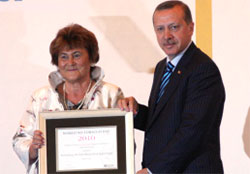Award Ceremony: presenting the WHO Director-General’s Special Recognition Award for Contribution to Global Tobacco Control

WHO
Speech by Ms Zsuzsanna Jakab, WHO Regional Director for Europe
19 July 2010
Your Excellency Prime Minister Erdoğan, distinguished guests, ladies and gentlemen,
It is a great pleasure and honour for me to present this year’s the WHO Director-General’s Special Recognition Award for Contribution to Global Tobacco Control to His Excellency the Prime Minister of the Republic of Turkey, on behalf of WHO, the Director-General, Dr Margaret Chan, and all WHO staff who have worked on Turkey’s national tobacco control programmes.
Your Excellency, this award is given in recognition of your strong and continuous leadership in tobacco control and in promoting healthy lifestyles and smoke-free environments in Turkey, driving your country to become one of the leaders in global tobacco control efforts.
By honouring your work, Your Excellency, WHO also honours your country.
Turkey takes tobacco control seriously, and has made good progress in controlling the tobacco epidemic. During recent years, the country has adopted laws restricting or banning smoking in all public places, including the hospitality sector. Turkey’s cigarette prices have been increased; in addition, they are taxed at more than 75% of the price, as recommended by the WHO MPOWER[1] policy; this is one of the highest rates in the WHO European Region. Public awareness, education and advocacy are ensured by cooperation on tobacco control among diverse partners: government, public health, society and nongovernmental associations. Here in Turkey, you have worked hard to protect children, pregnant women and other adults against tobacco smoke at work and in schools, public transport, hospitals, restaurants and bars. Today, Turkey is part of a small elite: three countries in the WHO European Region (Turkey, the United Kingdom and Ireland) whose public places are 100% smoke free.
Cooperation and collaboration between the Turkish Government and WHO have always been exemplary. But it is the Turkish Government that has made effective use of WHO technical support and, mostly, the support that Bloomberg Philanthropies and its tobacco partners have offered in this field of public health. We have made an impact mostly through offering evidence-based guidance, expert advice, training and tools for supporting and monitoring tobacco control implementation. It is Turkey that has implemented tobacco control measures on a national scale and in an assertive and sustained manner over the years.
We salute all these efforts. It took courage and insight to get this far. WHO stands beside countries that are working hard to overcome political differences in the name of public health. I am personally committed to seeing that all provisions of the WHO Framework Convention on Tobacco Control are successfully implemented in Turkey, which ratified it in 2004.
Since its adoption 7 years ago, the WHO Convention has been ratified by 168 countries in the world, including 45 countries in the WHO European Region. Globally, 20 countries have adopted – with tremendous success – smoke-free laws similar to the one in Turkey.
An increasing number of governments are finding that the health gains of taking action hugely outweigh the perceived political costs, and one country after another is introducing tough legislation to combat smoking. We are very pleased that Turkey is – and we hope it will stay – at the forefront of this group.
According to WHO experts, Turkey is aiming to achieve the full implementation of all WHO Convention’s provisions by the end of 2010. With the progress to date and the expertise gathered here and in other countries, the aim of fully protecting people from the consequences of tobacco consumption, by reducing the demand for and supply of tobacco, is within reach. In other words – together we can do it.
I also want to commend Turkey’s achievements in conducting and publishing its first Global Adult Tobacco Survey results. I should stress that Turkey was the first country to collect the data, which proves country’s commitment towards fulfilling its obligations under the Framework Convention on Tobacco Control.
One finding from the Survey has caught my particular attention. Up to 16 million adults in Turkey are tobacco smokers, which is over 22% of the population. This is of course an alarming figure, but it also helps to map the country’s objectives and benchmark its future progress.
I am very optimistic about future progress, particularly after the Turkish authorities have taken policy measures to protect their people from exposure to second-hand smoke and implement pictorial warning labels.
I am also optimistic because Turkey has – and will continue – to enjoy strong international support from an unprecedented number of partners that will help the country to reach its tobacco control objectives. WHO is grateful to Bloomberg Philanthropies, the Centers for Disease Control and Prevention (CDC) in the United States of America and the CDC Foundation for all their assistance.
The success of Turkey is observed closely in many countries in the Region and globally. To maintain this success, continuous commitment by all stakeholders is required. We believe that our partnership will help us to overcome the global tobacco epidemic that threatens the lives of hundreds of millions of men, women and children during this century. We thank you for the implementation of a comprehensive tobacco control law that has already saved thousands of lives.
I stand here with you today to ensure WHO’s continued support for your national efforts to protect your population against tobacco and, on behalf of Dr Chan and WHO, I wish you every success in your future work.
Thank you.
[1] MPOWER stands for: Monitor tobacco use and prevention policies; Protect people from tobacco smoke; Offer help to quit tobacco use; Warn about the dangers of tobacco use; Enforce bans on tobacco advertising, promotion and sponsorship; Raise taxes on tobacco.



